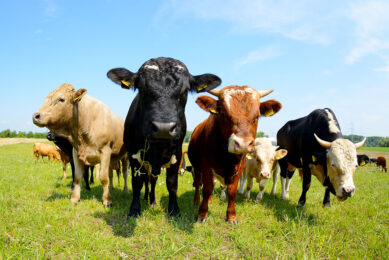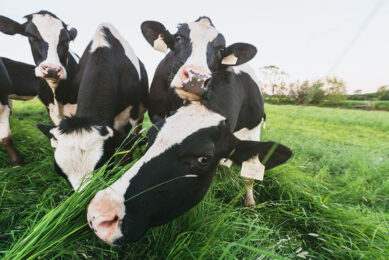Perfecting the science behind performance minerals
![[Photo: Vincent ter Beek, RBI]](https://www.allaboutfeed.net/app/uploads/2020/12/001_254_rb-image-2818022.jpeg)
The right chemistry and peer-reviewed research are the keys to developing effective trace mineral products and verifying that they are absorbed and utilised by the animal. All About Feed spoke to Dr Terry Ward, who heads the research division of Zinpro Corporation, about the quest to further fine-tune the use of organic trace mineral nutrition.
The animal feed industry has taken tremendous steps forward in recent decades owing to increased knowledge about organic trace minerals and their benefits to livestock and poultry. Consequently, the industry has changed the way it formulates diets. “As an industry, we have moved forward from rudimentary formulation based on crude protein and digestible energy to a more precise formulation in which we measure, say, amino acids available in the intestines and net energy. We have moved from least-cost formulations to diets that cover the animal’s nutritional needs – diets that are economically justifiable and that boost the performance and health of the animal. To be able to achieve these objectives, we have incorporated research-proven technologies, such as Zinpro Performance Minerals®, that do more than just cover basic nutritional needs,” explains Dr Terry Ward, global director of Research & Nutritional Services at Zinpro Corporation.

Biography
Dr Terry Ward, global director of Research & Nutritional Services at Zinpro Corporation.
Ward earned both Doctoral and Master’s degrees from Louisiana State University and a Bachelor’s degree from Oklahoma State University. He began his professional career in Decatur, Indiana as a swine and poultry nutritionist and later joined Zinpro as a research nutritionist. In 2002, Ward was appointed director of the company’s Research and Nutritional Services (RNS) team. He was promoted to global director of RNS in 2012. In this role, he is responsible for managing the company’s global research and technical service activities for all species worldwide.
Selecting the right molecule is the key
“Certainly we have known about the importance of trace minerals for many decades. However, trace mineral supplementation for livestock only became commonplace in the last 40-50 years. Prior to that, the recommendations for minerals typically only included some of the macro minerals (e.g. calcium, phosphorus and sodium chloride). Today, we know a lot more about the different sources, their quality and animal requirements,” says Ward. He adds that the source and form of the mineral is very crucial. The difference between organic and inorganic is a major one. Yet huge variation also exists between the sources of organic trace minerals. Ward continues: “Bioavailability is an important criterion for a trace mineral, but bioavailability doesn’t necessarily equal performance of the product. Enhanced bioavailability begins with the chemistry of the product/molecule. What we see in some of the ordinary molecules is that the ligand bonds (that hold the molecule together) are so tight that the mineral components are never released in the animal or absorbed. The animal will then shed the mineral in the faeces, for example. On the other hand, some mineral structures are so loosely bound that the mineral doesn’t even stay together. This means that the mineral component dissociates and becomes less effective.”
Ward: “The positive effects from optimal mineral nutrition are transferred to the next generation.”
It all started with zinc
The animal nutrition company Zinpro, with its headquarters in the USA, was established in 1971 and has invested heavily in finding the right molecules from the beginning. Ward: “Our company started with zinc methionine: a zinc molecule bound to a methionine molecule. ZINPRO® zinc methionine is referred to as the original molecule because it was the first pa-tented, specific metal amino acid complex from our company. Research trials showed that this particular zinc product is effective in improving the health of livestock. A significant breakthrough occurred around 1980 with the discovery that the zinc in ZINPRO zinc methionine improved the condition of hooves in cattle. Although Zinpro Corporation remained focused on zinc for the first several years as ZINPRO zinc methionine gained recognition, the company began to grow rapidly. Shortly thereafter we discovered other amino acids were useful for forming a complex with a mineral molecule.” “Products featuring this unique, patented 1:1 complex proved to be quite effective for trace mineral absorption and utilisation and therefore positively affected performance in the animal,” Ward further explains. The minerals from Zinpro are built on a molecule that consists of one metal ion bound to one amino acid ion – called either metal amino acid complexes or metal-specific amino acid complexes. The company holds numerous patents on these products and the processes by which they are made. “Our products have been proven time and again to demonstrate a response in the target species that is superior to the performance obtained by feeding ordinary trace minerals,” explains Ward.
Different applications with same mineral
“With our extensive experience and almost 200 peer-reviewed research publications, we have perfected the process to create our unique molecules, which we call Performance Minerals. These molecules have the right bonding strength and bio-efficacy to deliver trace minerals for efficient absorption and utilisation by the animal,” according to Ward. The reason the company started with the zinc molecule seems logical. Although all minerals are important, it is often said that zinc is the king of trace minerals. This is because zinc impacts hundreds of enzyme systems. “We know that zinc plays an important role in keratin production. Keratin, in turn, is a major component for hoof, claw and epithelial tissue repair. So for cattle, we use zinc to improve hoof health. Zinc can also be used to improve the coat and skin health of pets. The same mineral can therefore be used for different applications. Metabolically, it demonstrates the same effects, but the benefits are observed and appreciated differently. Next to zinc, copper and manganese are also very important minerals. Ward: “We always formulate a total nutritional programme, as each trace mineral has its own specific and unique metabolic functions and can therefore have adverse effects on other minerals in the diet. This is why we adopt a holistic approach when formulating a nutritional programme for each species. Even at the individual farm, we look at challenges and goals so we can make a tailor-made mineral programme for that particular farm.”
Hoof health gets more attention
The benefits from adding Zinpro Performance Minerals® to a balanced diet have been proven by science and Ward believes the opportunities are still almost endless. Ward: “The importance of hoof health has been emphasised only for the last 15-20 years. During this time, farms have become more specialised. This, in turn, has increased the focus on hoof health. Today, farmers have greater awareness of and knowledge about the economic and animal performance impact of lameness. They are investing in improved management practices and tools to improve hoof health and minimise lameness in their operations. Zinpro has a long history of delivering
valuable educational programmes and tools for dairy, swine, beef and poultry to help improve animal wellness.” Research increasingly validates the link between nutrition, healthy claws and production. Trace minerals are essential in building a more competent immune system and reproductive tract, as well as improved skin and claw integrity. This improves an animal’s ability to resist disease and perform. Zinpro recently introduced a trace mineral product (Availa®Plus) for dairy and beef cattle in the USA, Canada and in European markets. Research has shown improved epithelial tissue integrity and immunity when diets were supplemented with a specific combination of trace minerals (including Availa-Plus). “This unique product is highly efficacious and decreases the prevalence and severity of digital dermatitis (DD) in cattle. Research at the University of Wisconsin in the USA showed that feeding Holstein steers diets containing Zinpro Performance Minerals decreased the incidence of M2 lesions and decreased the size of M1 and M2 lesions. Additional research in breeding-age heifers supplemented with the same specific combination of trace minerals resulted in a significant decline in the prevalence of DD. This is just one example of how we give farmers access to new nutritional tools to be able to address challenges on their farm in a preventive way.”
Feeding tailor-made formulations for optimal performance
According to Ward, supplementing heifer diets before they enter the lactating herd is the most effective control method for digital dermatitis. Does this mean that trace minerals need to be fed as early as possible to animals? “This is an interesting area of research and we certainly study the timing effect of feeding trace minerals. We do know that the sooner you can feed our minerals, the better the outcomes for the animals. This is particularly the case for reproducing animals, as the positive effects from optimal mineral nutrition are transferred to the next generation. Think of breeding hens, dairy heifers, beef heifers and gilts. We want to feed them for a lifetime of performance, which is a real key area of research for us,” explains Ward. Obviously the formulation of the trace minerals might change a little over the production period, as absorption might decrease somewhat when the animal ages. At the same time, the total consumption increases when the animal grows. For every stage, there is a tailor-made formulation.
Ward: “We want to further examine our products at the cellular and gene level.”
Ward explains that antibiotic reduction is another key focus area. Ward: “Antibiotics are moving away from animal diets, and this trend is really taking off in the USA right now, especially in the poultry sector. To be able to move away from antibiotics successfully and to maintain the same production levels as before, you need a robust and healthy animal with a well-functioning immune system. I believe that well-balanced nutrition with Performance Minerals is part of the solution to producing healthy and robust animals that can grow under farm conditions in which no preventive antibiotics are needed. Another key area of research is the application of trace minerals for animals that are under stress conditions. Ward: “Stressful conditions for animals may include heat stress, performance stress or nutritional stress. Recent research at Iowa State University showed that feeding nutritionally complete diets fortified with zinc in the form of Zinpro Performance Minerals ameliorated the effect of heat stress on small intestine integrity in growing pigs and Holstein steers.”
Looking for new molecules
To find solutions for new challenges in the animal production sector worldwide (such as reducing antibiotic use), Zinpro is constantly looking for new products/molecules or fine-tuning existing products through robust peer-reviewed research. Ward: “By conducting well-designed, multiple studies, we reveal the true responses in a particular animal species. We also measure the products’ return on investment. This is important for our customers and is the reason they are confident about using the product in their herd.” Ward is certain that the company will bring new molecules to the market relatively soon. “We have a team of scientists and chemists who study molecules and look for new molecules continually. These can come from nature or can be newly synthesised compounds. Once discovered, molecules that have never been seen before can be turned into a new feed additive,” he explains.
Zinpro is also looking for novel strategies to study the how and why of its products even closer. “We know that our products work, but we want to further examine the impact they have on feeding at the cellular and gene level. Much has been made about nutrigenomics over the last decade or more. But an ability to explain and apply the results has eluded much of the industry. Zinpro is committed to ongoing research to explain the “why” of our products with sound, well-replicated studies.” Ward concludes that the demand for Performance Minerals is growing rapidly. “The growth in animal production (including the fast growth of aquaculture) and the need for natural solutions to produce healthy and robust animals is fuelling a growing demand. As a result, we have exciting times ahead of us.”











